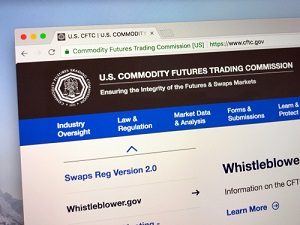CFTC Whistleblower Program Annual Report Shows Program Open for Business, yet Challenges Persist

Fifteen million dollars is how much the United States Commodity Futures Trading Commission’s (CFTC) Whistleblower Program paid whistleblowers in FY 2019 according to the agency’s annual report to Congress. This amount includes:
- $7 million to one individual whistleblower;
- Over $2 million to a non-insider whistleblower who provided independent analysis of market data; and,
- Close to $1.5 million to a whistleblower who first reported internally.
In the last two cases, awards were based not just on the CFTC’s recovery, but also on recoveries in related actions brought by undisclosed federal regulators. Payments reflect the CFTC’s acknowledgement of just how important whistleblowers are to the agency’s enforcement efforts. In fact, “forty percent” of CFTC ongoing investigations “now involve whistleblowers” according to CFTC Director of Enforcement James McDonald.
While the 2019 Annual Report shows that the CFTC Whistleblower Program continues to expand, challenges over its administration remain. The CFTC Whistleblower Program was created as part of the Dodd-Frank Wall Street Reform and Consumer Protection Act of 2010 to incentivize whistleblowers, no matter their location or nationality, to come forward and provide information about Commodity Exchange Act violations. If the information provided leads the CFTC (or a related agency) to collect monetary sanctions, eligible whistleblowers may receive between 10 to 30 percent of such sanctions. In addition, the CFTC is committed to protecting the confidentiality of whistleblowers and has authority to take action against companies that retaliate against whistleblowers by using gag clauses in confidentiality, pre-dispute arbitration or similar agreement to prevent would-be whistleblowers from turning to the CFTC and report wrongdoing.
Since the CFTC Whistleblower Program opened shop in 2011, it has paid approximately $100 million to whistleblowers allowing the agency to collect over $800 million in sanctions. Although these numbers are remarkable, the CFTC Whistleblower Program still has considerable catching-up to do when compared to the largely similar SEC Whistleblower Program which has paid over $387 million in whistleblower awards.
More than a Fistful of Dollars – Award Payouts and Tips down from 2018 but Keeping the Trend of 2017
In fiscal year 2019, the Commission issued five awards totaling more than $15 million, including two awards based on related actions and $2.5 million to a whistleblower who could have received more had the report not been delayed. The whistleblower who received the highest award, almost $7 million, had relevant information that led the agency to open an investigation even though such information was not entirely accurate, highlighting the need of specialized counsel in curating and distilling the facts to both maximize whistleblower rewards and better assist the CFTC in fighting fraud.
This year’s annual report confirms that 2018 was, undoubtedly, a banner year for the program, featuring the largest CFTC award to date to a single whistleblower: $30 million for exposing a massive fraud at JP Morgan. In 2019, the CFTC received 455 tips, a reduction by nearly half with respect to 2018 but in line with the trend observed in 2017 with 465 tips. Among the areas covered are currency fraud, money laundering, employer retaliation, and market manipulation.
CFTC Enforcement Priorities and Outreach
For the first time, the CFTC used the Whistleblowing Office website to publish alerts and raise awareness to the public about specific areas where fraud is taking place and which represent an enforcement priority for the Commission. These areas are:
- Virtual currencies, as fintech issues continue to disrupt markets and create opportunities for fraud;
- Foreign corrupt practices, where commodity exchange violations are connected to bribing foreign government officials;
- Insider trading; and
- Bank Secrecy Act violations, money laundering, and failure to file suspicious activity reports.
Outreach efforts by the CFTC Whistleblower Office are certainly commendable. As whistleblowers become more prominent and gain mainstream media exposure for simply doing their jobs, the CFTC Whistleblower Office’s proactiveness should be celebrated and nurtured.
Areas for Improvement Still Remain
Despite the good news, a skeptic might wonder whether the CFTC is simply not fast enough when acting on tips. This year’s report confirms the agency has received 483 award applications from whistleblowers since 2012. However, the CFTC has issued only fourteen awards. Does this mean that over 97% of award applications are typically undeserving? Perhaps, but this is an important issue the agency needs to grapple with should it continue to strengthen its partnership with whistleblowers.
Timeliness of award payment is another issue of contention which can ultimately discourage whistleblowers from coming forward altogether. A current bipartisan bill in the Senate, the Whistleblower Programs Improvement Act, will require the CFTC and SEC to issue an initial award determination within one year of the deadline to apply for an award. As CFTC Director of Whistleblower Office Christopher Ehrman said “it often takes integrity and courage to report specific, timely, and credible information about misconduct, and such information enhances [the CFTC’s] ability to police the market.” Such recognition to whistleblowers should at least translate into timely payment for the personal toll of whistleblowing.
READ MORE:
- CFTC Whistleblower Program
- Related Post: CFTC Whistleblower Program has a Banner Year, but Challenges Remain
- The SEC Whistleblower Program 2018 Annual Report: Record-Breaking Year
- SEC Whistleblower Program
- International Whistleblowers
- Constantine Cannon’s Whistleblower Team
- I think I have a whistleblower case
- Whistleblower FAQs
Tagged in: CFTC Whistleblower Reward Program, Financial and Investment Fraud, Fraud in CFTC-Regulated Markets, International Whistleblowers, Statistics, Whistleblower Rewards,